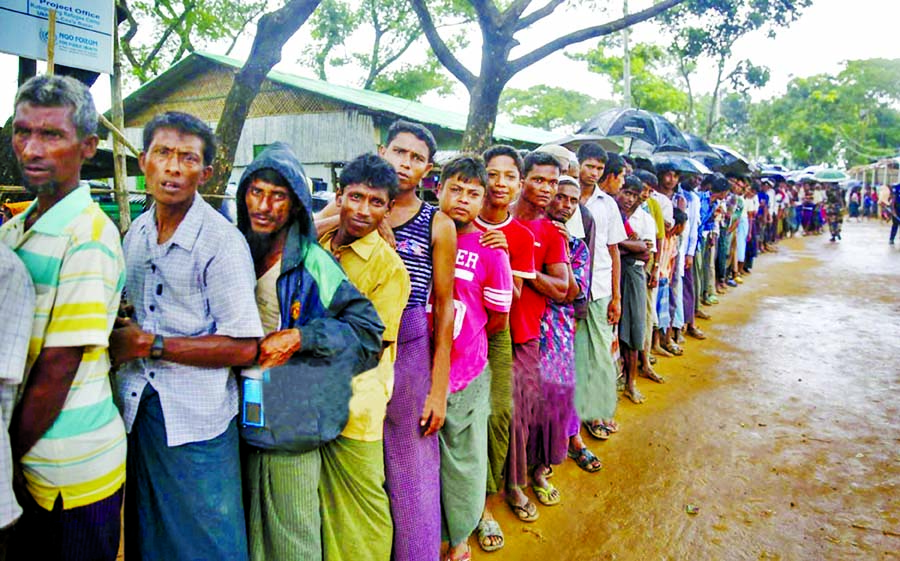
Special Correspondent :
No ‘safe zone’; Myanmar is adamant. The government of Myanmar has turned down a proposal of Bangladesh to create ‘safe zone’ for the Rohingya ethnic minorities in the Rakhine State, formally known as Arakan province.
U Zaw Htay, Deputy Director General at the Ministry of the State Counsellor Office and also spokesperson of Myanmar President’s Office, in a recent statement said Myanmar government has rejected the ‘safe zone’ proposal fearing possible interference by the ‘international actors’.
Quoting statement of U Zaw Htay, The Myanmar Times on Thursday reported: “The government rejects the plan to create a safety zone. The international actors will exert control if such zone is ever established.”
Usually, the Myanmar government does not recognize the Muslims in Rakhine who call themselves as Rohingyas, but often refer them as “Bengalis” to indicate them illegal migrants from Bangladesh.
Bangladesh Foreign Minister AH Mahmood Ali, however, refrained from making any comment when he was asked about the rejection of the ‘safe zone’ proposal. “A minister of the Myanmar State Counsellor Daw Aung San Suu Kyi’s department has wanted to meet me in New York. As Bangladesh wants to discuss the Rohingya issue with Myanmar government, so I’ve decided to meet the Myanmar Minister,” he said on Thursday.
Earlier, Bangladesh President Abdul Hamid on September 10 proposed that a “safe zone” for the displaced Myanmar nationals should be created under the initiatives and supports of the United Nations and organizations such as the Organization of Islamic Cooperation [OIC]. He came up with the call at a meeting with his Turkish counterpart Recep Tayyip Erdogan on the sideline of the OIC summit in Kazakhstan.
Later, a report published by Reuters last week said that Bangladeshi government sent the proposal about creating a “safety zone” to the Myanmar government through the International Committee of the Red Cross.
Meanwhile, Foreign Minister AH Mahmood Ali yesterday further said that Prime Minister Sheikh Hasina taking part in the 72nd United Nations General Assembly will propose to create pressure on Myanmar to implement Kofi Annan Commission’s recommendations.
“Bangladesh will constantly try to create international pressure on Myanmar government to take back the Rohingya refugees. The PM Sheikh Hasina will propose the international community to get a solution over the Rohingya crisis….About 400,000 Rohingyas, mostly women, children and elderly persons, have so far entered the country,” Mahmood Ali said.
Interestingly, Myanmar leader Daw Aung San Suu Kyi has decided to skip the UNGA event in the wake of widespread criticism over ethnic cleansing in Rakhine State.
The Myanmar Times added: “U Zaw Htay also explained in a press briefing on Wednesday in Nay Pyi Taw, why Daw Aung San Suu Kyi, in her capacity as Foreign Minister and State Counsellor, decided not to attend the upcoming UNGA in New York.
U Zaw Htay said she is cancelling the trip to take care of the internal stability, to pursue and prioritise security, as information concerning terrorist attacks has been received and also due to the health conditions of President U Htin Kyaw. Vice president, U Henry Van Thio will attend the UN conference.
State Counsellor Daw Aung San Suu Kyi is scheduled to deliver a state of the union address about the National Reconciliation and Peace Process on September 19 to discuss the situation in Rakhine State, The Myanmar Times added.
The media also reported that Myanmar government has denied the accusations that about 400,000 Rohingyas have fled to Bangladesh from Myanmar after government security forces allegedly committed human rights violations.
U Zaw Htay said that of the 417 Muslim villages in Rakhine State, residents from 34 villages have either fled or remained, while residents from 176 villages abandoned their homes. However, 260 villages are still inhabited by the Muslims who reject the ideology or persuasion of terrorists.
The decades-old conflict in Rakhine flared recently on August 25, when Rohingya insurgents attacked several police posts and an army base. Since then, an estimated 400,000 Rohingya have fled to Bangladesh, according to the U.N. High Commissioner for Refugees, joining more than 500,000 others already living there in the refugee camps since the early 1990s.

